Why speech & language skills are essential developmental milestones for children
For a young child, learning to use and understand language is the first step towards literacy, and forms the base for learning to speak, read and write.
Speech & language development is an essential part of early childhood development, because it helps kids to:
- Understand others feelings & express their own
- Apply critical thinking
- Solve problems
- Develop & nurture relationships
In the early years of a child’s life, when their brains are developing at the fastest rate and absorbing & processing new information constantly, it is important to give them every opportunity to enhance their speech & language skills, which will help them learn and read better when they start school. A child’s language development skills continue to develop throughout their childhood and adolescence.
Encouraging speech and language development
in young children
Talk to them

Right from birth, speak with your child and have a regular conversation as you would with a person who can talk. The idea is to use different words in different contexts to engage them in mental exercises to help them understand the intricacies of
language. For example, you can talk to your little one about a red toy and then speak about eating a red apple. This helps your child understand the way words are used and
communicated. It is important to pause between sentences and give your child a turn to respond.
Always respond to the sounds and gestures that your child makes as a response to your words. For example, if your child points at a toy and makes a cooing sound, it’s their way of saying ‘I want that toy’, so before simply handing it to them, you can say ‘do you want that red ball?’.
Right from birth, speak with your child and have a regular conversation as you would with a person who can talk. The idea is to use different words in different contexts to engage them in mental exercises to help them understand the intricacies of language. For example, you can talk to your little one about a red toy and then speak about eating a red apple. This helps your child understand the way words are used and communicated. It is important to pause between sentences and give your child a turn to
respond.
Always respond to the sounds and gestures that your child makes as a response to your words. For example, if your child points at a toy and makes a cooing sound, it’s their way of saying ‘I want that toy’, so before simply handing it to them, you can say ‘do you want that red ball?’.
When you treat every attempt at communication that your child makes with importance and always respond to them, it encourages children to keep communicating with you and in turn developing their speech & language skills.
Read to them
Reading to your child about various topics helps them hear & understand words used in many different contexts, and greatly enhances a child’s language development skills.
Whenever possible, it is a good idea to link what’s happening in the book to something in your child’s life. For example, you can say, ‘The girl in the book loves her green doll, just like you love your red ball’. Pick books with interesting pictures so that you can also chat about these with your child by describing what they are.
It is a good idea to read aloud with your child and point to the words as you say them, as this simple step enables your child to understand the link between spoken and written words.
Age-wise speech & language
development goals

3-12 months
3-12 months
Around the age of 3 months, your baby will coo, smile and laugh. As they grow older, babies begin to try making different sounds and communicate using gestures like waving and pointing.
Around 4-6 months, your baby will start making babbling sounds. Babies will start with single-syllable sounds like ‘ba’, before repeating them like ‘ba ba ba’.
After babbling comes the ‘jargon phase’ where the sounds your child makes will sound like they’re trying to tell you something, but their speech will not sound like recognisable words. Normally, the first actual words with meanings that a child speaks will start at around 12 months old.
12-18 months
During this age is when children often begin to say their first intelligible words with meaning. Over
the next few months your child’s knowledge of words and vocabulary will grow. You can further
enhance their vocabulary by talking, reading, and holding conversations with them using words in
different contexts. At this stage your child has the ability to understand more than they can actually say out loud. They will also be able to follow simple instructions like ‘sit down’ or ‘look up’.
2 to 3 years
At this age, most children will start putting 2 – 3 words together to form short ‘sentences’. Your child will be able to understand a lot of what you are saying to them, and you will also begin to understand most of what your child is trying to communicate with you.
3-5 years
At this age your child will be able to have longer, more complex conversations about their thoughts and feelings. Your little one might also start talking about things, people or places that aren’t present at the moment. For example, ‘When will we go to Grandma’s house?’
Your child will also start to talk about different topics, and their vocabulary will continue to grow.
At My Gym, our award-winning early development programs are designed for holistic overall development of your little one. Our experienced teachers enhance the physical, mental, cognitive, social, and emotional skills of young children through fun learning activities that our kids thoroughly enjoy and look forward to.
Sign up for a trial class at any of our centres across Singapore to experience the difference for
yourself!



